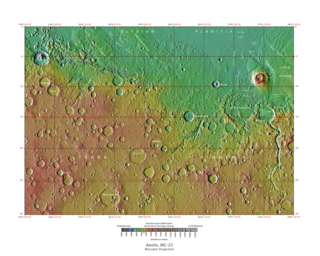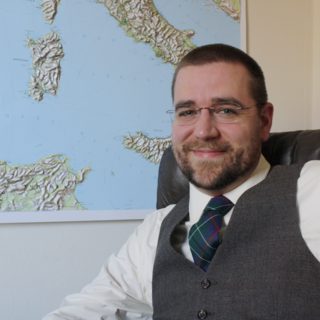Related Research Articles

The Scientific Revolution was a series of events that marked the emergence of modern science during the early modern period, when developments in mathematics, physics, astronomy, biology and chemistry transformed the views of society about nature. The Scientific Revolution took place in Europe starting towards the second half of the Renaissance period, with the 1543 Nicolaus Copernicus publication De revolutionibus orbium coelestium often cited as its beginning.
Deep time is a term introduced and applied by John McPhee to the concept of geologic time in his book Basin and Range (1981), parts of which originally appeared in the New Yorker magazine.

Michio Kaku is an American theoretical physicist, futurist, and popularizer of science. He is a professor of theoretical physics in the City College of New York and CUNY Graduate Center. Kaku is the author of several books about physics and related topics and has made frequent appearances on radio, television, and film. He is also a regular contributor to his own blog, as well as other popular media outlets. For his efforts to bridge science and science fiction, he is a 2021 Sir Arthur Clarke Lifetime Achievement Awardee.

The natural environment or natural world encompasses all living and non-living things occurring naturally, meaning in this case not artificial. The term is most often applied to the Earth or some parts of Earth. This environment encompasses the interaction of all living species, climate, weather and natural resources that affect human survival and economic activity. The concept of the natural environment can be distinguished as components:

American Heroes Channel is an American multinational pay television channel owned by the Warner Bros. Discovery Networks unit of Warner Bros. Discovery. The network carries programs related to the military, warfare, and military history and science.

Big History is an academic discipline which examines history from the Big Bang to the present. Big History resists specialization, and searches for universal patterns or trends. It examines long time frames using a multidisciplinary approach based on combining numerous disciplines from science and the humanities, and explores human existence in the context of this bigger picture. It integrates studies of the cosmos, Earth, life, and humanity using empirical evidence to explore cause-and-effect relations, and is taught at universities and primary and secondary schools often using web-based interactive presentations.
Motor Trend is an American sports television network owned by Motor Trend Group, a subsidiary of Warner Bros. Discovery through its sports unit. It primarily broadcasts automotive-themed programming, including motorsports events.

Ancient Chinese scientists and engineers made significant scientific innovations, findings and technological advances across various scientific disciplines including the natural sciences, engineering, medicine, military technology, mathematics, geology and astronomy.

References to climate change in popular culture have existed since the late 20th century and increased in the 21st century. Climate change, its impacts, and related human-environment interactions have been featured in nonfiction books and documentaries, but also literature, film, music, television shows and video games.

Western culture, also known as Western civilization, Occidental culture, or Western society, is the heritage of social norms, ethical values, traditional customs, belief systems, political systems, artifacts and technologies of the Western world. The term applies beyond Europe to countries and cultures whose histories are strongly connected to Europe by immigration, colonization or influence. Western culture is most strongly influenced by Greco-Roman culture, Germanic culture, and Christian culture.

The Aeolis quadrangle is one of a series of 30 quadrangle maps of Mars used by the United States Geological Survey (USGS) Astrogeology Research Program. The Aeolis quadrangle is also referred to as MC-23 . The Aeolis quadrangle covers 180° to 225° W and 0° to 30° south on Mars, and contains parts of the regions Elysium Planitia and Terra Cimmeria. A small part of the Medusae Fossae Formation lies in this quadrangle.

Deep Green Resistance (DGR) is a radical environmental movement that views mainstream environmental activism as being ineffective. The group, which perceives the existence of industrial civilization itself as the greatest threat to the natural environment, strives for community organizing to build alternative food, housing, and medical institutions. The organization advocates sabotage against infrastructure, which it views as necessary tactics to achieve its goal of dismantling industrial civilization. Religious and ecological scholar Todd LeVasseur classifies it as an apocalyptic or millenarian movement.

Planet Earth is a seven-episode 1986 PBS television documentary series focusing on the Earth, narrated by Richard Kiley.

Curiosity is an American documentary television series that premiered on August 7, 2011, on the Discovery Channel. Each episode focuses on one question in science, technology, and society and, for the first season, features a different celebrity host. Stephen Hawking hosted the premiere episode titled "Did God Create the Universe?", which aired simultaneously on seven Discovery Communications networks: Discovery Channel, TLC, Discovery Fit and Health, Animal Planet, Science, Investigation Discovery, and Destination America. Season one consists of 16 episodes.

Michael William Duncan is an American political history podcaster and author. A self-described "complete history geek", his love for history grew from an interest in ancient civilizations as a child, with a particular affinity for Roman history. After not finding any Roman history podcasts in 2007, Duncan began The History of Rome, a narrative podcast chronicling events from the founding of Rome until the collapse of the Western Roman Empire. The podcast concluded in 2012. A year later he began Revolutions, which ran for ten seasons over the course of nine years, covering the American, French, and Russian revolutions, among others. The series' main narrative ended in July 2022.
Civilization: Is the West History? is a 2011 British TV documentary that tells how Western civilisation, in five centuries, transformed into the dominating civilisation in the world.

The Curiosity Stream, also known as the Curiosity Channel, is an American media company and subscription video streaming service that offers documentary programming including films, series, and TV shows. It was launched in 2015 by the founder of the Discovery Channel, John S. Hendricks. As of 2021, it was reported to have approximately 20 million subscribers worldwide across its direct and bundled platforms.
The Silurian hypothesis is a thought experiment which assesses modern science's ability to detect evidence of a prior advanced civilization, perhaps several million years ago. The name "Silurian" derives from the eponymous sentient species from the BBC science fiction series Doctor Who, who in the series established an advanced civilization prior to humanity.
References
- ↑ "5 Alarm Music". 5 Alarm Music. Retrieved 2017-04-17.
- ↑ "Douglas Cohen". Variety. 2013-12-16. Retrieved 2017-04-17.
- ↑ "Tom Collins". Sdgi.ie. Retrieved 2017-04-17.
- ↑ Spangler, Todd (2015-01-15). "John Hendricks, Founder of Discovery Channel, Launches Internet Subscription VOD Service". Variety. Retrieved 2017-04-17.
- ↑ "Film-maker lands documentary host role in California". Stuff. 3 April 2016. Retrieved 2017-04-17.
- ↑ "How Big Bang Shaped Civilization: 'Deep Time' Documentary Premieres". Space.com. Retrieved 2017-04-17.
- 1 2 3 "Deep Time History". Looking Glass International. Archived from the original on 2018-03-06. Retrieved 2017-04-17.